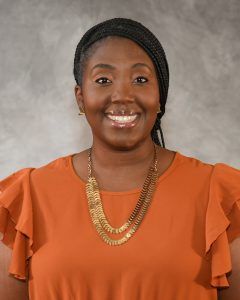When Keosha Simmons makes a presentation about the importance of advance care planning, it's far from an academic exercise.
The Empath Health Community Partnership Specialist speaks from experience.

Simmons was the primary caregiver for her father before he passed away from lung cancer in 2018. While she was his only child, her father was the oldest in a family of 13 children. When he got sick, there were many opinions about what should be done.
Fortunately, Simmons had helped her father document his wishes for healthcare decisions that needed to be made during the final days of his life.
"Presenting them with this document, it removed it from being about me as his caretaker," Simmons said. "It allowed everybody to see these were his wishes."
Simmons' father died under the care of Suncoast Hospice, a member of Empath Health. The experience spurred her interest in Empath Health, and she joined the organization in November 2021.
April 16 is designated National Healthcare Decisions Day, the perfect time for healthcare organizations to raise awareness and provide education about the importance of advance care planning and encourage the public to put a plan in place.
What is advance care planning? It involves discussing and preparing for future decisions about medical care that can be implemented if someone becomes seriously ill and unable to communicate.
Planning involves:
- Learning about the options available to you.
- Reflecting on your values, cultural and spiritual beliefs, and treatment preferences and goals.
- Discussing your wishes with loved ones and healthcare providers.
- Choosing a decision maker and documenting your wishes in a legal document called a living will.
- Sharing copies of your plan with your healthcare surrogate, loved ones and providers.
The two most common forms of advance directives are the living will and the designation of a healthcare surrogate.
The living will is a legal document that informs doctors and other healthcare providers which treatments a person wants, which treatments they don't want, and in what conditions those treatments apply. Simmons said when she helps people create living wills, she asks specifically about whether they want CPR, to be placed on a ventilator or to use a feeding tube. Completed living will forms do not need to be notarized, as a signature makes it a legal document.
A healthcare surrogate is a person designated to carry out the living will should the patient be unable to communicate. Choosing a surrogate is an essential part of the advance care planning process.
"You need to think about, 'If I was unable to make a decision for myself, who would I entrust that decision to? Who do I feel would speak for me and advocate for me?'" Simmons said.
Simmons recommends making three copies of all advance directives. One should be kept in a prominent place in your home, another with your primary care physician and a third with the healthcare surrogate.
Simmons is certified as an advance care planning facilitator like every Empath Health Community Partnership Specialist. Through its My Life, My Choice program, Empath provides facilitations, workshops and consultations that guide and empower individuals, families and healthcare providers to communicate, document and honor healthcare wishes.
Facilitators can help individuals develop plans that reflect their goals, values and beliefs. Personal appointments are available, or groups may schedule a free presentation at a place of business, congregation, civic group, adult living facility, neighborhood meeting or book club. Families can have the presentation together. Some of the most effective presentations have been part of a Family Night Dinner, in which a family member hosts a dinner at their home and invites our Community Partnership Specialists to present.
"I know it's an uncomfortable topic," Simmons said. "But I actually like giving the presentation because I think in the end we walk away with a peace of mind."
To schedule an individual or group advance care planning session, contact Empath Health at Community@EmpathHealth.org or call (727) 523-3427.
